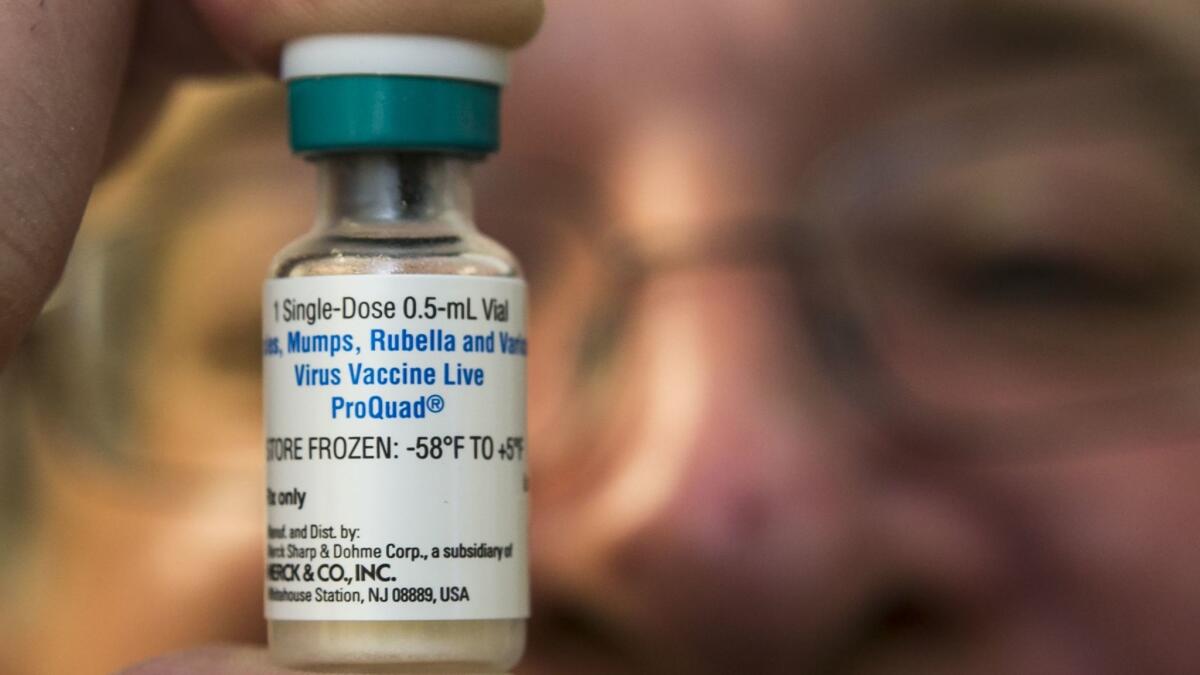Opinion: Will 2017 be the year the anti-vaccination movement goes mainstream?

- Share via
As hard as it is to believe, a medical marvel that has saved countless millions of children from illness and death is under assault. And anti-vaccination activists may have found a powerful ally in the next president of the United States.
During the campaign, President-elect Donald Trump said he supported vaccines, but he also recounted a story about a 2-year-old who “just the other day” was immunized and then came down with a fever and is now autistic. He didn’t say that vaccines cause autism, but he sure hinted at it. This is the classic tactic of anti-vaccination advocates, who have no credible research to back up their suspicion that childhood immunizations cause a whole host of “vaccination injuries” ranging from autism to death.
Recounting a suggestive anecdote is one thing, but will Trump go so far as undermine the success of the country’s vaccination program? Maybe. Earlier this week, Robert F. Kennedy Jr., son of the late U.S. attorney general and noted vaccination skeptic, said the PEOTUS asked him to head up a commission on vaccination safety. Perhaps Trump was merely humoring Kennedy. A commission? Yeah, yeah, sure, Bobby, whatever you want. A spokeswoman for Trump did say he was “exploring the possibility.”
“We ought to be debating the science,” Kennedy said after visiting with Trump this week. Debating settled science? How does that work? The one study that did find a link has been soundly discredited. Still this idea of a vast medical conspiracy involving Big Pharma and legislators to sell dangerous vaccinations to unsuspecting parents persists.
California lawmakers may remember Kennedy because he supported the group of people who actively (and sometimes nastily) fought SB 277, the 2015 law that ended personal and religious belief exemptions from the state’s immunization requirement for public school children. Use of the exemptions had been eroding the “herd immunity” levels in certain pockets of the state — mostly wealthier communities where it is fashionable to view vaccines as problematic as trace pesticides on produce. A measles outbreak at Disneyland in December 2014 highlighted the growing holes in the vaccination net and spurred lawmakers to pass SB 277.
That was not the end of the fight. Lawsuits challenging the constitutionality of the law are still working their way through the courts. A new White House commission legitimizing the junk science behind the fear of immunizations will only add fuel to this smoldering fire.
In the meantime, the anti-vaccination activists have now turned their sights on a new proposal from the author of SB 277 known as the Bill of Rights for Children and Youth in California, or SB 18, by Sen. Richard Pan (D-Sacramento), a pediatrician. Its vague language regarding what is best for kids raises questions about whether it is the framework for a legislative assault on parental rights. There’s a rally on Tuesday at the Capitol.
Follow me @marielgarzaLAT
A cure for the common opinion
Get thought-provoking perspectives with our weekly newsletter.
You may occasionally receive promotional content from the Los Angeles Times.




